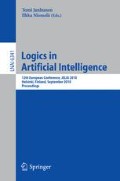Abstract
This paper aims at providing a formal account of lying – a dishonest attitude of human beings. We first formulate lying under propositional modal logic and present basic properties for it. We then investigate why one engages in lying and how one reasons about lying. We distinguish between offensive and defensive lies, or deductive and abductive lies, based on intention behind the act. We also study two weak forms of dishonesty, bullshit and deception, and provide their logical features in contrast to lying. We finally argue dishonesty postulates that agents should try to satisfy for both moral and self-interested reasons.
Access this chapter
Tax calculation will be finalised at checkout
Purchases are for personal use only
Preview
Unable to display preview. Download preview PDF.
References
Adler, J.E.: Lying, deceiving, or falsely implicating. J. Philosophy 94(9), 435–452 (1997)
Augustine, S.: Lying. In: Treatises on Various Subjects, Fathers of the Church, vol. 56, pp. 45–110 (1952)
Bonatti, P.A., Kraus, S., Subrahmanian, V.S.: Foundations of secure deductive databases. IEEE Transactions on Knowledge and Data Engineering 7(3), 406–422 (1995)
Caminada, M.: Truth, lies and bullshit, distinguishing classes of dishonesty. In: Proc. IJCAI Workshop on Social Simulation (2009)
Carson, T.L.: The definition of lying. Noûs 40(2), 284–306 (2006)
Chisholm, R.M., Feehan, T.D.: The intent to deceive. Journal of Philosophy 74(3), 143–159 (1997)
Colombetti, M.: A modal logic of intentional communication. Mathematical Social Sciences 38, 171–196 (1999)
Demos, R.: Lying to oneself. Journal of Philosophy 57(18), 588–595 (1960)
Fallis, D.: What is lying? Journal of Philosophy 106(1), 29–56 (2009)
Frankfurt, H.G.: On Bullshit. Princeton Univ. Press, Princeton (2005)
Halpern, J., Moses, J.: A guide to completeness and complexity for modal logics of knowledge and belief. Artificial Intelligence 54, 349–379 (1992)
Kupfer, J.: The moral presumption against lying. Review of Metaphysics 36, 103–126 (1982)
Mahon, J.E.: A definition of deceiving. J. Applied Philosophy 21(2), 181–194 (2007)
Mahon, J.E.: Two definitions of lying. J. Applied Philosophy 22(2), 211–230 (2008)
Mitri, S., Floreano, D., Keller, L.: The evolution of information suppression in communicating robots with conflicting interests. Proc. National Academy of Sciences 106(37), 15786–15790 (2009)
Morris, J.: Can computers ever lie? Philosophy Forum 14, 389–401 (1976)
O’Neill, B.: A formal system for understanding lies and deceit. In: Jerusalem Conference on Biblical Economics (2003)
Peirce, C.S.: Collected Papers of Charles Sanders Peirce. Harvard University Press, Cambridge (1958)
Searle, J.R.: Speech Acts. Cambridge University Press, Cambridge (1969)
Sklar, E., Parsons, S., Davies, M.: When is it okay to lie? A simple model of contradiction in agent-based dialogues. In: Rahwan, I., Moraïtis, P., Reed, C. (eds.) ArgMAS 2004. LNCS (LNAI), vol. 3366, pp. 251–261. Springer, Heidelberg (2005)
Staab, E., Caminada, M.: Assessing the impact of informedness on a consultant’s profit. In: Proc. 21st Benelux Conf. on AI (BNAIC 2009), Eindhoven, pp. 397–398 (2009)
Urchs, M.: Just lying. Logic and Logical Philosophy 15, 67–89 (2006)
Author information
Authors and Affiliations
Editor information
Editors and Affiliations
Rights and permissions
Copyright information
© 2010 Springer-Verlag Berlin Heidelberg
About this paper
Cite this paper
Sakama, C., Caminada, M., Herzig, A. (2010). A Logical Account of Lying. In: Janhunen, T., Niemelä, I. (eds) Logics in Artificial Intelligence. JELIA 2010. Lecture Notes in Computer Science(), vol 6341. Springer, Berlin, Heidelberg. https://doi.org/10.1007/978-3-642-15675-5_25
Download citation
DOI: https://doi.org/10.1007/978-3-642-15675-5_25
Publisher Name: Springer, Berlin, Heidelberg
Print ISBN: 978-3-642-15674-8
Online ISBN: 978-3-642-15675-5
eBook Packages: Computer ScienceComputer Science (R0)

